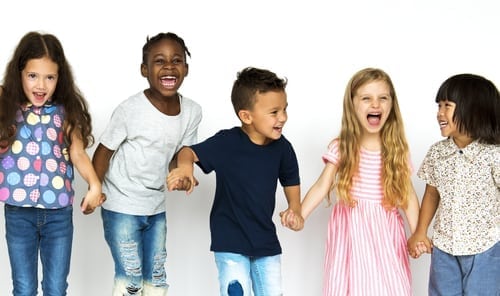Self-Awareness helps children learn about their emotions, personal goals, and values. It also helps them understand that all of these are interconnected. Self-Management is about regulating your emotions and persevering through difficulties. Social Awareness is learning to understand, empathize, and feel compassion for others regardless of cultural, religious, or other differences.
This summer, encourage children from elementary to high school to work within these skills by engaging in the following activities.
Self-Awareness
To explore self-awareness, provide the following context for learners to understand why naming their feelings is necessary in developing self-awareness.
Sometimes understanding yourself can be challenging, but this is an important skill worth developing. Have you ever noticed how your emotions can change throughout the day? Sometimes it happens before we realize it. One minute, you’re calmly eating a meal, and the next you’re rolling on the floor laughing. Happy or positive feelings are often easier to manage than sad or negative feelings, but it’s impossible to manage them if you are not able to name them. Identifying your feelings helps your brain connect to your emotions and allows you to think about how you should respond versus just reacting. You can name your feelings most accurately if you know the emotional vocabulary that best describes those feelings.
Go through the list of emotions, and think about which ones you have experienced or those you have observed others experiencing. Alternatively, watch a television show or movie and track the emotions of one character. Name each emotion the character portrays. Once you are comfortable recognizing emotions in others, start naming your own. When you have a particularly strong emotion, name it! Then think about what made you feel that way. For a closer examination, keep track of your own emotions and the incidents that prompted each one. Once you have a list of at least ten emotions and their causes, use the list to identify more qualities about yourself. What do you like or dislike? What makes you laugh or cry? What do you value most?
Self-Management
After learners have had an opportunity to learn about themselves, they can use that information to build other skills. Help learners begin to develop self-management with this goal-setting activity centered on what they love.
First, select something you love to do, and then set a goal to challenge yourself. For example, if you love basketball, challenge yourself to make 1,000 shots over the summer. If reading is your favorite pastime, commit to reading one or two books per week. What if music is your passion? You could compose a song or learn to play a new instrument. Choosing to grow in an activity that you love could lead to a lifelong passion and a potential career!

Social Awareness
Because summer provides so many opportunities for social interactions, encouraging learners to become more socially aware just makes sense! Start with a likely summer scenario to explore social awareness.
In a group setting such as summer camp or family gatherings, there are many opportunities to learn about others and hopefully come to appreciate what makes you both similar and different. When you are paired or grouped with others, use this time to get to know one another. Ask a friend or family member to share with you something he or she likes to do. Then try it together! This is a great chance to experience something new and learn more about the people around you. Don’t forget to also share something that you like, because it can be just has fun to help others learn about you and your interests.
Social and emotional learning can be some of the most important and fun learning a student can experience. Discovering more about themselves and the people in their lives has immeasurable value to students, and summer is the perfect time to focus on this type of learning.
For more information about SEL and related activities, visit the following websites: Committee for Children, CASEL, American Institute for Research




